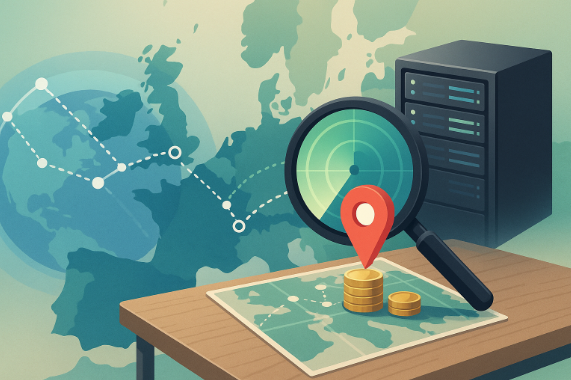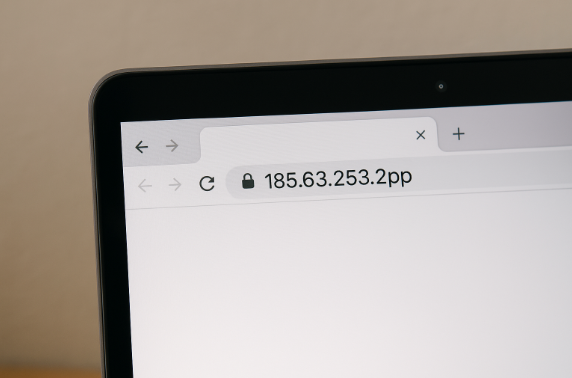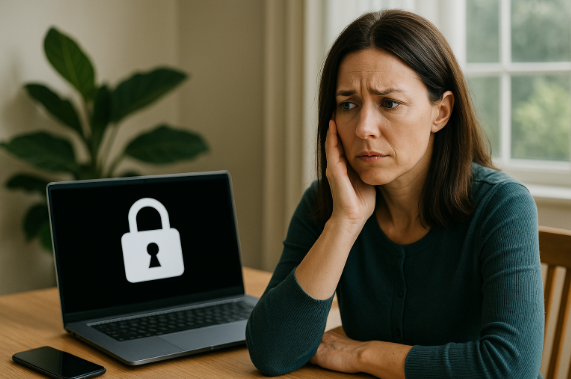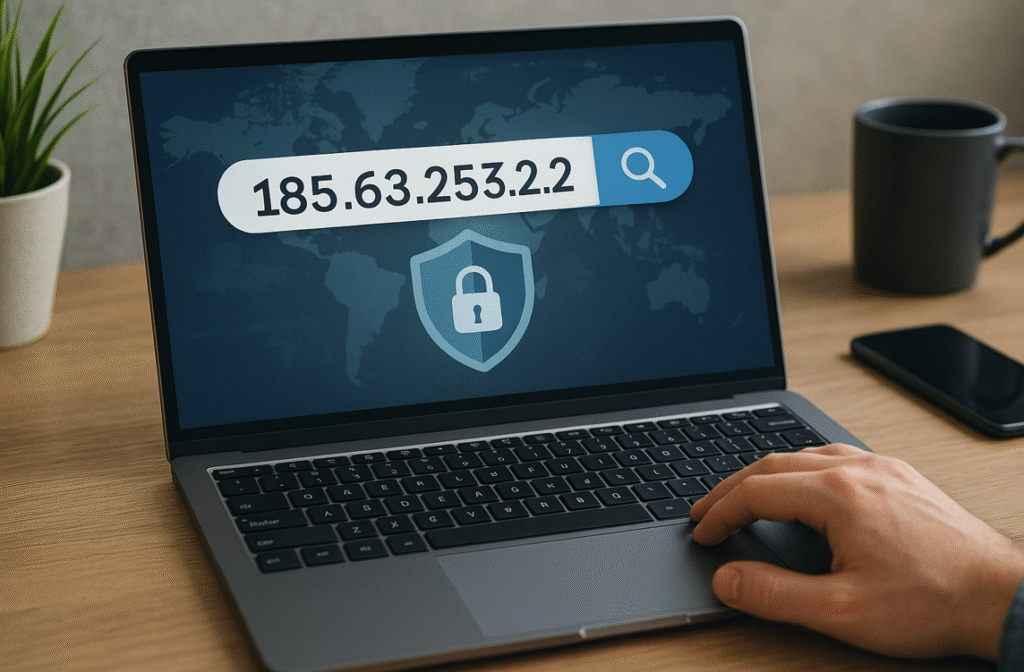When you browse the internet, you may come across strange-looking addresses such as 185.63.253.2pp. For most everyday users, this can look confusing or even worrying. Is it a real IP address? Could it be harmful? Or is it just a harmless typo?
In this article, we’ll break down what 185.63.253.2pp actually means, why you might see it online, and how you should respond if it shows up on your network logs or while browsing.
What is 185.63.253.2pp and why might you see it online?
Every device connected to the internet has an IP address, which works like a digital postcode. Normally, IPs look like 185.63.253.2 – a standard IPv4 address made up of four numbers.
But 185.63.253.2pp looks unusual because of the “pp” at the end. This could appear in different situations:
-
A typo in a website link or server log
-
A misconfigured domain or proxy address
-
An attempt by malware to disguise or confuse users
-
A browser extension redirecting traffic through a proxy
👉 In most cases, this is not a standard IP but a string you may see by accident or due to a hidden configuration.
Is 185.63.253.2pp a real IP address or a misconfiguration?
To answer this, let’s first understand how IP addresses are structured.
-
A valid IPv4 address has four sets of numbers separated by dots (e.g., 185.63.253.2).
-
IPv6 addresses look different and contain both numbers and letters, but not in the format of “pp”.
-
The “pp” at the end makes 185.63.253.2pp invalid as a normal IP.
So, if you see it:
-
It might be a typo or formatting error.
-
It could be a proxy notation, where “pp” refers to “proxy port” or a specific setting.
-
In rare cases, it could be a malware-generated string.
As cybersecurity expert Bruce Schneier puts it:
“Security is not about absolutes, it’s about reducing risk to an acceptable level.” Seeing unusual addresses like this is often not dangerous in itself, but understanding the context is key.
Where is 185.63.253.2pp located? Can you trace its origin?

If we strip the “pp” and only look at 185.63.253.2, we can attempt a geolocation lookup. IP geolocation tools map addresses to countries, cities, and ISPs.
However, keep in mind:
-
IP geolocation is not always 100% accurate.
-
VPNs and proxies can make an IP appear from a different region.
-
Adding “pp” to the end makes it invalid, so tools may not recognise it.
Example: Location lookup for 185.63.253.2
| IP Address | Possible Country | ISP/Organisation | Notes |
|---|---|---|---|
| 185.63.253.2 | Varies by lookup | Proxy/VPN ranges | May belong to hosting server |
| 185.63.253.2pp | Invalid format | N/A | Likely typo or proxy config |
Could 185.63.253.2pp be linked to a proxy or VPN service?
Many unusual IP strings, including those ending in odd characters, can be connected to proxy or VPN services. These services route your internet traffic through another server to hide your real location.
Why this matters:
-
VPNs use standard IPs, but some free or shady providers use non-standard naming.
-
Attackers sometimes disguise malicious proxies using similar notations.
-
Some adware or browser plugins automatically redirect traffic through hidden proxies.
👉 If you see 185.63.253.2pp in browser logs, it could be a proxy notation rather than a standard IP.
Should you worry if you see traffic from 185.63.253.2pp?

Not every strange IP is a cause for alarm, but it’s worth being cautious. Here’s why:
-
Potential risks:
-
Could be linked to bot traffic
-
May point to spam servers or malware
-
Might be a sign of misconfigured software
-
-
Harmless causes:
-
A simple typo
-
Software formatting error
-
Non-standard but not malicious proxy
-
A balanced approach is to check and verify before assuming the worst.
How can you check if 185.63.253.2pp is safe?
If you spot this address in your logs, there are several tools you can use:
-
WHOIS Lookup – to see who owns the IP range
-
AbuseIPDB – to check if it’s blacklisted
-
VirusTotal – to scan domains and IPs for malicious activity
-
Router/Firewall Logs – to confirm whether traffic is ongoing
👉 If “185.63.253.2” shows up as suspicious in these databases, block it. If “185.63.253.2pp” doesn’t register, it’s likely just invalid.
What steps should you take if 185.63.253.2pp appears on your network?
If you’re not sure whether this address is safe, take precautionary steps:
-
Run a malware scan on your device.
-
Block the IP range temporarily in your firewall.
-
Check router logs for repeated attempts.
-
Contact your ISP if suspicious traffic continues.
-
Reset browser extensions to remove hidden proxy settings.
Why does 185.63.253.2pp have “pp” at the end?

One of the biggest questions is what the “pp” means. It is not part of a valid IP address, so why does it appear?
Possible reasons include:
-
Proxy or Port notation – Some configurations append “pp” to indicate “proxy port” or a modified connection.
-
Typo or Formatting Error – A simple input mistake when writing or copying the IP.
-
Browser Extension Add-on – Certain adware or plugins rewrite links with extra characters.
-
Malware Obfuscation – Malicious scripts sometimes add characters to make addresses harder to identify.
👉 The important point is that “pp” is not an official part of the IP standard. If you see it often, check your browser extensions or security settings.
How can everyday users run an IP lookup for 185.63.253.2 safely?
Many people see an IP like 185.63.253.2 and don’t know what to do next. Here’s a simple, safe process:
Step-by-step IP lookup:
-
Copy the valid IP part: 185.63.253.2
-
Go to a trusted lookup site (such as IPinfo.io or WhatIsMyIPAddress.com)
-
Paste the IP and run a search
-
Review the results for:
-
Country & City – where the IP is registered
-
ISP/Organisation – who owns it
-
Blacklist Status – whether it’s linked to spam or attacks
-
⚠️ Avoid random “free tools” that look suspicious, as some may log your own IP.
What are the privacy concerns around IPs like 185.63.253.2pp for UK users?

In the UK, your IP address is considered personal data under GDPR because it can be used to identify you. This raises questions:
-
Your ISP logs activity – Your broadband provider knows when and where your IP connects.
-
Websites track visitors – Many sites log IPs to build profiles or block regions.
-
VPNs & Proxies – Using these services masks your IP, but free ones can actually sell your data.
For UK internet users, this means:
-
Always check whether an unknown IP (like 185.63.253.2pp) could be linked to a third-party service.
-
Use reputable VPN providers if privacy is your goal.
-
Report repeated suspicious IP traffic to your ISP – they are required by law to investigate.
Conclusion: What does 185.63.253.2pp really mean for everyday users?
For most people, 185.63.253.2pp is not a real IP address but a sign of a typo, misconfiguration, or proxy reference. While it is unusual, it doesn’t always mean danger.
-
If you see it once, it may be harmless.
-
If it keeps appearing, it’s worth checking for malware or unwanted proxy use.
-
Staying aware of strange addresses helps you keep your devices and network secure.
In short, 185.63.253.2pp is not a standard IP – treat it with caution, but don’t panic.
🚀 Stay Safe Online – Take Action Today
If you keep seeing unusual IP addresses like 185.63.253.2pp on your network, don’t ignore them. Stay one step ahead by:
-
Running a quick IP safety check using trusted tools
-
Securing your devices with updated antivirus software
-
Considering a trusted VPN service to protect your privacy
👉 Want more tips on keeping your online activity secure? Subscribe to our newsletter and get easy-to-follow cybersecurity advice straight to your inbox.
FAQs about 185.63.253.2pp
Is 185.63.253.2pp a real IP address?
No, the “pp” makes it invalid as a standard IP address. The valid part is 185.63.253.2, which can be traced to hosting or proxy services.
Can someone hack me through 185.63.253.2pp?
Not directly. But if it’s linked to suspicious traffic, hackers may be probing your network. Blocking it is a safe step.
How do I block 185.63.253.2pp on my network?
You can block the valid portion (185.63.253.2) in your router firewall or use security software to block the range.
What’s the difference between 185.63.253.2 and 185.63.253.2pp?
The first is a standard IP address, while the second is invalid and likely a proxy or typo.
Why do I keep seeing strange IP addresses in my router logs?
Routers record every connection attempt. Many strange IPs belong to bots, scanning tools, or proxy networks, which are common online.
I’m Laura Wilson, a passionate blogger and content creator with a deep interest in business, finance, and entrepreneurship. I’ve had the opportunity to write for several premium blogs, sharing insights & practical advice for individuals & small businesses. I’m the founder and publisher of ukbusinessmag.co.uk, where I focus on creating valuable, easy-to-understand content to help UK startups & SMEs grow.



